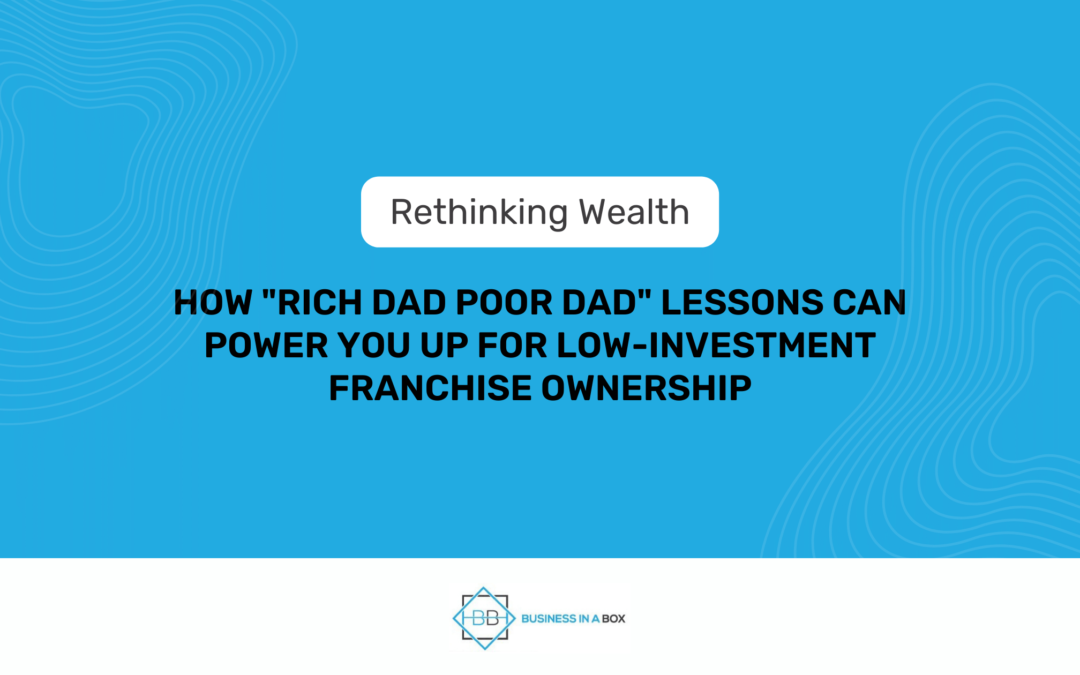Robert Kiyosaki’s “Rich Dad, Poor Dad” is a financial literacy classic. It challenges traditional views on money and wealth creation, offering a roadmap to financial freedom.
For aspiring franchisees seeking low-investment, high-margin, fast cash-flowing opportunities, Kiyosaki’s lessons can be a source of insights.
Here are some lessons we can get and how to apply them:
Lesson #1: The Rich Don’t Work for Money, Money Works for Them
This core principle shatters the traditional “work-for-a-paycheck” mentality.
The wealthy focus on building assets – things that put money in their pockets, even while they sleep. Owning a successful franchise can be a powerful asset, generating income through royalties, fees, and overall business growth.
Applying this to Franchises: Choose a franchise model with a proven track record of consistent cash flow. Focus on building a strong foundation, implementing systems, and attracting talented employees. As your franchise thrives, it becomes an asset that works for you, freeing up your time and energy.
Lesson #2: Financial Literacy is Key
Kiyosaki emphasizes the importance of understanding financial statements, asset types, and tax strategies. Many aspiring franchisees underestimate the financial complexities involved.
Applying this to Franchises: Before diving in, educate yourself on franchising basics. Understand the Franchise Disclosure Document (FDD), analyze financial projections, and consult with a financial advisor. Learn about different tax implications and optimize your business structure for maximum benefit.
Lesson #3: Mind Your Business
Kiyosaki highlights the difference between a job (trading your time for money) and a business (a system that generates income without your constant involvement).
Applying this to Franchises: A successful franchise isn’t just a passive investment. While the franchisor offers a proven system, you’ll still need to be actively involved in day-to-day operations, marketing, and building your customer base. Develop systems that streamline operations and allow you to delegate tasks effectively.
Lesson #4: The Power of Leverage
Kiyosaki encourages leveraging other people’s money (OPM) and assets to build wealth. Franchises often offer advantages in this regard.
Applying this to Franchises: Many franchise models have a lower upfront investment compared to starting a business from scratch. Additionally, you leverage the brand recognition and established systems of the franchisor, minimizing the initial risk and capital required. Consider financing options and explore ways to attract talented employees who can contribute their expertise.
Lesson #5: Financial Education is Lifelong
Kiyosaki emphasizes continuous learning as a key to financial success. The world of business and franchising is constantly evolving.
Applying this to Franchises: Don’t just rely on the initial franchise training. Continuously educate yourself on industry trends, marketing strategies, and best practices for running a successful franchise. Attend industry conferences, network with other franchisees, and subscribe to relevant resources.
Beyond the Book: Additional Considerations for Franchise Success
- Find Your Passion: Don’t just chase profits. Choose a franchise concept that aligns with your interests and values. Passion fuels perseverance, especially during challenging times.
- Embrace the Grind: Building a successful franchise takes time, effort, and resilience. Be prepared to work hard, overcome obstacles, and constantly improve your business.
- Build Relationships: Focus on building strong relationships with your customers, employees, and the franchisor. These connections form the foundation of a thriving franchise.
The “Rich Dad Poor Dad” Mindset for Franchisees
With these core principles from Kiyosaki’s book, you can see franchising not just as a way to make money, but as a path to building assets and achieving financial freedom.
Remember, it’s about creating a system that works for you, using the power of a proven brand, and continuously seeking knowledge.

Recent Comments